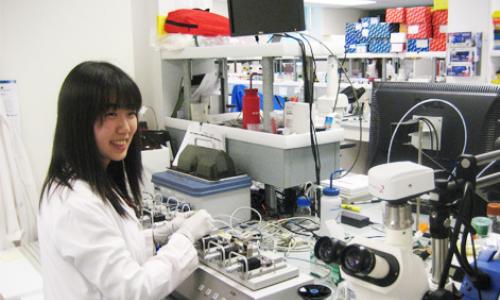
Are you currently seeking for Co-op jobs and stuck in a slump? I completely understand the struggle. The search for a Co-op position can be quite a stressful process — you have to read through job descriptions, write cover letters, and prepare for interviews while simultaneously worrying about whether you can land a job before the end of the semester. You may find it difficult to find a job that interests you or find it difficult to get a job offer when there are lots of other students applying for the same job. If you’re in this position, try considering a self-directed Co-op! Remember that there are hundreds of other jobs beyond the online Co-op job listings that you can apply for.
After receiving rejection after rejection, I had found it very difficult to stay motivated to continue job seeking even when spending several hours preparing for an interview. It wasn’t until I stumbled across a non-Co-op job posting on LinkedIn for the position as a Clinical Operations Associate at Telus Health MyCare and gained confidence to continue my Co-op search. I was intrigued by the job description, the company’s values, and was excited to build experience in the healthcare industry as a Health Sciences student. I reached out to my hiring manager and Co-op Coordinator to propose my interest in having my work experience at Telus Health MyCare as a Co-op work term. Shortly afterwards, I was pleased to accept a job offer and secure my first self-directed work term. Opposed from a regular Co-op work term, a self-directed work term is where you are able to create your own Co-op work term by connecting with an employer who has not previously posted a job with the SFU Co-op program. I would highly suggest seeking a self-directed work term, as you will develop targeted job search skills and gain exposure to job opportunities that might not be available otherwise.
When securing a self-directed work term, it’s crucial to remember a few things. It can be beneficial to initially discuss your approach with your Co-op Coordinator in advance to receive additional advice with ideas of how to present the proposal to your employer or how they can explain the Co-op program in more detail and provide a letter of support if necessary. To prepare for your interview, make sure to plan what you will say or discuss with your employer when exploring the possibility of pursuing Co-op position within their organization. Provide a brief explanation of what the Co-op program is, employer expectations, and why you believe the job would add to your Co-op experience. When meeting with your employer, treat this as you normally would with any interview. Do your research on the organization and industry ahead of time, and send a thank you note or email after the meeting acknowledging the time they gave you.
As a Clinical Operations Associate, I work alongside leaders in technology, physicians, and medical experts, and hold the responsibility of rolling out the operations behind Telus Health MyCare. Telus Health MyCare is a free healthcare mobile app that lets you to digitally monitor your health and check symptoms, consult with doctors and medical professionals, and access your clinical records. My tasks and responsibilities as a Clinical Operations Associate include managing the healthcare technology used for navigating patient records, booking appointments, completing requisitions, patient calls and emails, and much more. I found that taking patient calls have enhanced my interpersonal skills, as I learned how to actively listen to the concerns and experiences of patients. As Clinical Operations Associates, our job is to provide support for patients so that they receive the best care possible.
Being able to understand and witness the whole process of patient care is one of the most interesting and rewarding parts of this job. I am able to be a part of the process in between different parts of care, such as creating lab or imaging requisitions after virtual consultations, contacting hospitals or specialist offices to book appointments, and interacting with both patients and physicians to help provide seamless care. Even though we can read about Canada’s healthcare system in textbooks, it’s truly a whole new experience to actually work in the field. On a daily basis, I am able to directly contribute to different patient flows of their health and interact with them along the process. I especially enjoy being able to see the new idea of understanding healthcare that Telus Health MyCare offers for patients. Approaching my fourth month working at Telus Health MyCare, I am very fortunate to have received continuous support and guidance from all members of my team. I’m extremely grateful for the opportunity to be a part of a team that strives to provide accessible healthcare in the hands of Canadians, empowering individuals to take action in their own health.
Making my position at Telus Health MyCare a self-directed Co-op experience was a very fulfilling decision. I found that I was able to approach my job with an open mind of finding new ways to improve in my role and create learning objectives that I can focus on developing. I’m also very fortunate to have a supportive supervisor who is there to support me along my Co-op journey. I strongly advise you to frequently connect with your work supervisor to check in with your learning objectives and keep your goals accountable. Not only you can benefit from these meetings by receiving feedback for your work performance and your accomplishments, but it also demonstrates your eagerness for improvement. On your own, you can create a list of your goals and add onto them throughout your work term experience. Consider your personal improvements, review your learning objectives, and set out ways you can accomplish them.
Along with setting up meetings with your supervisor for feedback, it can also be beneficial to ask your work supervisor to take on additional responsibilities outside of your job description. If you’re unsure what the opportunities are, try networking with your colleagues to discuss projects that they have accomplished in the past and ask for advice on how you can take on similar responsibilities. Taking on new tasks can open up new opportunities to gain additional skills as a Co-op student. When starting your job, it's important to create a network of people with whom you can exchange useful information to enable you to grow professionally. This can be one of the most beneficial opportunities of your Co-op work term that you otherwise would have not gotten the chance to receive.
Approach your self-directed Co-op experience with an open mindset and you will be surprised with all the opportunities that are presented to you. Take time to really immerse yourself in your job position and don’t forget that everyone’s Co-op practicum will be unique to their own individual experience. A new Co-op experience will be exciting but overwhelming at the same time, just remember to keep a positive attitude and cherish all the valuable experiences and opportunities you are given.
















